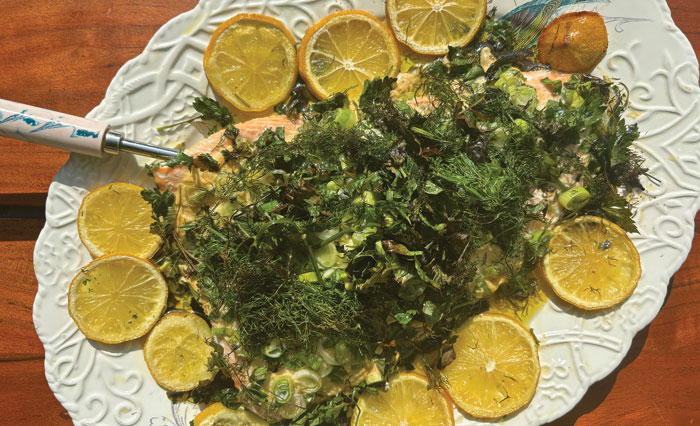“Русини, Поляки, Жиди, Німці, Австрійці, Мадяри, Вірмени, Цигани, Греки і Татари впродовж століть спільно творили Галичину — світ, в якому не було зла. Лише у нашій відповідальности зробити так, аби галицьке юнацтво замість балачок, хто ж більше любить „свою“ Неньку, цілувалося по брамах і кінах. І замість розмов, хто ж більший чудотворець — ксьондз чи рабин — ставили парафіян і кагал до відома — „я кохаю Шльому, а він — мене. І нема на то ради. Благословіть нас просто“.
Ця кнайпа — нехай і маленький, але чесний крок. Від страшного й трагічного — до світу нового. Незнаного. Ми просто віримо, що він росте у Пласті, Бріт Трумпельдорі та Бейтарі, у наших галицьких дітваках. І ми віримо, що колись Отець Небесний зглянеться над нами. Й знову ся всміхне. І наші діти будуть мудрішими, і добрішими за нас. У себе вдома. У Львові.“
“Ruthenians, Poles, Jews, Germans, Austrians, Hungarians, Armenians, Gypsies, Greeks and Tatars – all were for centuries creating Galicia together, a world with no evil. It’s our responsibility to make sure that instead of discussing who loves ‘his’ or ‘her’ Motherland more, the young people of Galicia are kissing behind each gate or door. And instead of discussing who is greater – a priest or a rabbi – they just inform the ones in churches and synagogues -‘I love Shloma, and he loves me. And there’s nothing here to discuss. Just give us your blessings’.
This place is a small, but an honest step. A step from the terrible and the tragic to the world of new. The world of unknown. We just believe, that this world is growing in Plast, Brit Trumpeldor and Beitar, in our Galician children. And we believe, that one day the Heavenly Father will look down at us and smile again. And our children will grow wiser and kinder then we are. Here at home, in Lviv.“
This is what I read on the menu’s cover sitting on the terrace of ‘Halyc’ka Zhydivska Knaipa’, which can be liberally translated as ‘Galician Jewish Pub’. It was a summer of 2011 in Lviv. Right in front of me was one of the narrow streets of Lviv’s old town called ‘Staroevreiska’, literally ‘Old Jewish street’. On my table there was a menu, all covered with the names of Jewish dishes, famous Jewish personalities of Galicia and images of rabbis and various orthodox attributes. On my left there was an empty space, seemingly left after a recently demolished building. It looked like something was still standing there a week ago and construction works were all about to start. In reality, the place didn’t change since 1939, when the Golden Rose synagogue was destroyed. However, there was one thing which I guessed – the construction of the new hotel was indeed planned there (luckily, the plan was rejected in a couple of months).
It is, unfortunately, quite obvious that together with the destruction of the Golden Rose the Jewish Lviv was destroyed forever. Couple of dozens of Jews populating Lviv today have settled there after the war. This dream of piece and harmony between Galician Ukrainians and Galician Jews is barely impossible – due to the absence of one of the parts. But what is even more frightening – the whole international Lviv, so lovely described in the pub’s introduction letter doesn’t exist anymore. Poles, Jews, Germans, Austrians, Hungarians, Armenians, Gypsies, Greeks and Tatars – all were forced to escape the city either by the Nazis, or by the Soviets. The only major international place of the city became the pub I was sitting in – a weird place where Ukrainians wear costumes of the old-times Jews, trying to copy the Jewish accent and are bargaining about the meal prices – they are not stated in the menu. It is not a Jewish restaurant – Jews visiting the city tend to avoid it, accusing it of being an antisemitic mockery. I myself would definitely recommend it – the place offers great food and drinks and quite extraordinary-designed premises. It is a part of the whole chain of restaurants, visualizing different sides of the old Lviv – ranging from Ukrainian Liberation Army shelter to the restaurant of Leopold von Masoch, the founder of sado-maso born in Lviv. Each of the places are great tourist attractions – only if the tourist is open-minded enough to play the game together with the waiters and the staff, playing shtetl Jews, Ukrainian partisans or even sado-masochists. It’s all definitely worth trying out. But Ukrainians disguised as Jews entertaining Ukrainian visitors on the ruins of the synagogue still remains one of the saddest things one can see in Lviv.






















 More news and opinions than at a Shabbat dinner, right in your inbox.
More news and opinions than at a Shabbat dinner, right in your inbox.